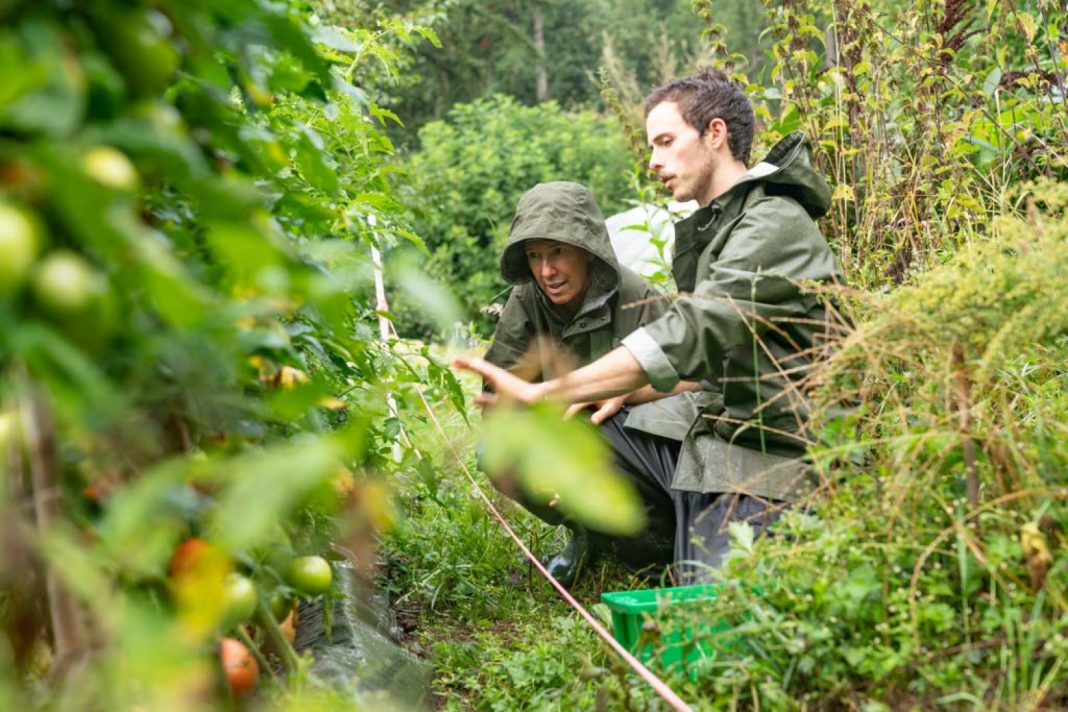Submitted by Shuana Bittle for The Evergreen State College
Bright green shishito peppers sizzle in salt and oil over induction burners in The Evergreen State College’s Sustainable Agriculture Lab. The garage-style door opens to the Organic Farm as senior Caleb Poppe sets out seven varieties of peppers. Evergreen food and agriculture students place one of each type in cups marked with corresponding numbers. Poppe gives a brief overview of the taste test procedure, then invites everyone to begin.
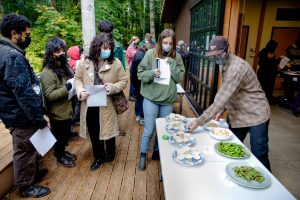
Before taking a bite, the students make notes on appearance: color, size and shape. They write observations about each pepper’s aroma. Finally, they taste and mark the flavor characteristics of each. They snack on bread between varieties to cleanse their palates. As they eat, they create a data set.
“It’s really fun to connect with these students and see them become invigorated by getting to taste something just 200 yards away from where it was grown,” Poppe says.
The event is part of Poppe’s ongoing research work with the Northern Organic Vegetable Improvement Collaborative, which aims to identify and breed the best-suited seed varieties for organic agriculture in the Northern United States. The collaborative includes researchers from the University of Wisconsin–Madison, Oregon State University, Washington State University and more.
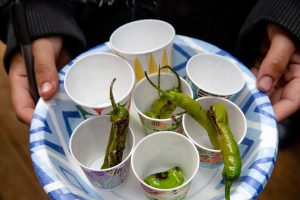
Poppe joined the NOVIC collaborative in 2019 as a research assistant in Evergreen’s Summer Undergraduate Research Fellowships program. Working with faculty Sarah Williams, Steve Scheuerell and Angelos Katsanis, he ran the Organic Tomato Field Trial at the college’s on-site farm, growing 13 varieties of tomatoes from seeds supplied by the Culinary Breeding Network based in Oregon.
“Our goal for this project is to study the different tomato plant pests and diseases of our region and how they affect organic tomato growth, tomato yields as well as their flavor,” wrote Poppe on his project blog. He made careful notes of growth rate, resistance to pests, and vulnerability to fungal infections as he took the plants from seedlings to harvest.
In addition to how well the plants grow in this region, Poppe wants to understand subjective measures about which varieties people most enjoy eating—which has implications for how well they could sell at market.
“Caleb wants to feed people and he’s interdisciplinary,” says faculty Sarah Williams. “He loves cooking, so the NOVIC field trial where you go from putting seeds in the ground, to growing, to eating what you grow—he loves every part of it. Some students just want the scientific data, some people only want to see what diseases affect the plants. Caleb wants the whole picture.”
Finding a Path
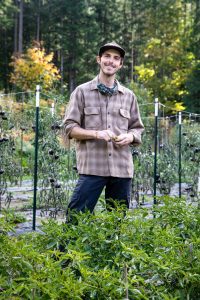
Poppe, 27, first learned about Evergreen from an AP English teacher, but his path didn’t lead directly from high school to college. Although he had been accepted to Evergreen, the Colorado native traveled the mountain states for several years working as a firefighter and cook before deciding to pursue a degree. “I think somewhere deep inside me, I knew that if I ever went to school it was going to be at Evergreen,” he says.
Poppe enrolled in 2017 wanting an educational path that fit his love of the outdoors. He took a program called Forest and Farms where he developed a love of soil science, then moved on to the Practice of Organic Farming program and began field trial research at the same time.
His first summer of research was followed by a second one growing radicchio, daikon, arugula and bok choi. During his third year, he did a NOVIC field trial with shishitos as a volunteer researcher.
Poppe has also been involved in Evergreen’s community garden, making it the focus of his capstone project, where he combined his research experience with an agricultural education model. Working with two different groups of students, he taught the science of soil regeneration through planting restorative crops: fruits, grains and vegetables.
The project incorporated themes of personal and community healing through farming. In-person meetings in the garden were therapeutic after a period of distancing due to COVID-19. The groups also held seminars about the connections between agricultural and social movements. Soon Poppe will present his capstone work at the 11th Organic Seed Growers Conference.
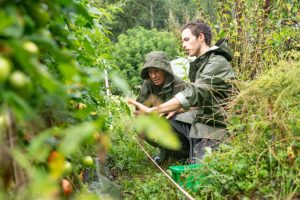
Now graduated, Poppe stays connected to the Organic Farm through his job as property caretaker. He also started a small farm operation on rented acres at a nearby farm, where he grows peppers for local business Splat Hot Sauce.
His fields are top priority, but he sometimes finds himself browsing jobs for farm educators. “That’s a job I could see myself doing,” he says. “Teaching the next generation these regenerative techniques that will help the planet in the long run.” For now, he is content to nurture seeds and grow along with them.
Learn more about Evergreen’s full set of academic pathways, including Food and Agriculture, at The Evergreen State College website.
Sponsored








































